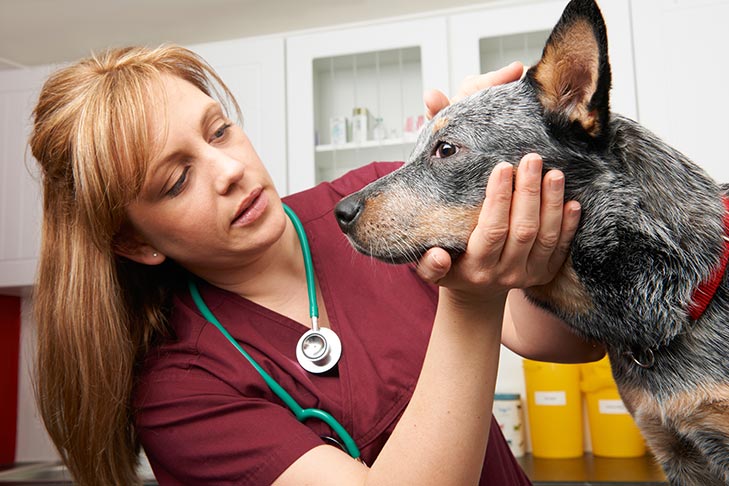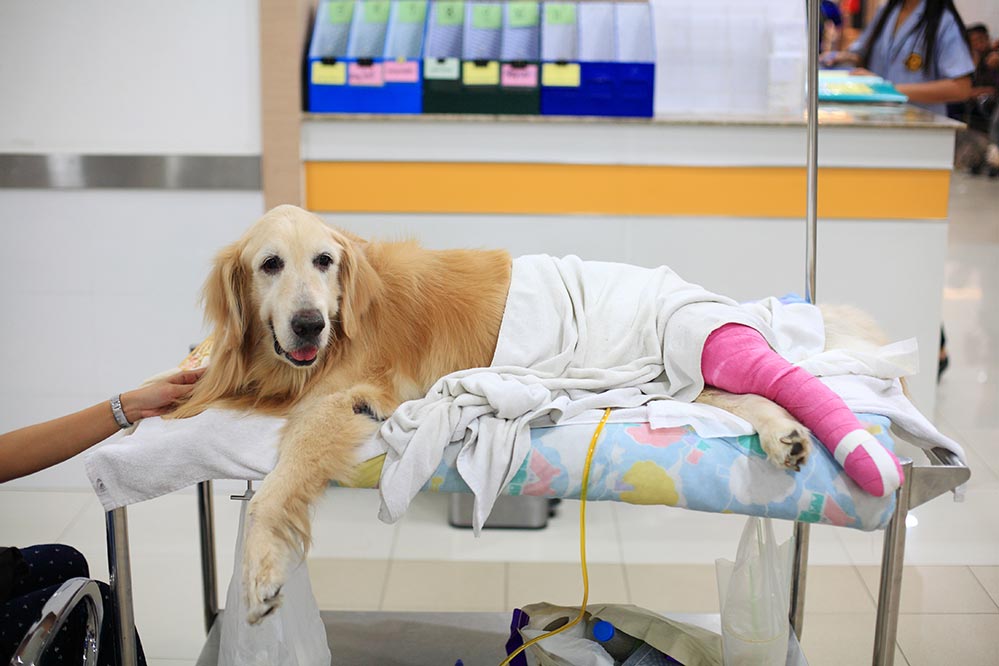- April 15, 2022
- No Comment
- 9 minutes read
What to do When you Can't Afford Healthcare for Your Dog – American Kennel Club

Every day, in animal hospitals around the country, dog owners receive the devastating news that there’s something seriously wrong with their pet. When the unexpected happens, the cost of pet healthcare can quickly burn through any budget, and according to the American Academy of Actuaries, only 1 to 2 percent of American pets are insured. So what can you do if your dog needs urgent or life-saving treatment, and you can’t afford to pay?
First: don’t despair. There are funds around the United States designed to help pet owners access affordable pet care and even free pet care, and keep their dogs healthy and thriving for as long as possible.
When Emily Brown noticed that her eight-year-old Golden Retriever Gertie was having trouble with a hind leg, then found a lump near her rear, she immediately took her to the Flint Animal Cancer Center at Colorado State University’s (CSU’s) Veterinary Teaching Hospital in Fort Collins, Colorado. Though it was more than 100 miles from her home, Emily knew that the facility would give Gertie the first-class care she needed—partly because of its global reputation, and partially because Emily herself had received exemplary care at CSU while fighting cancer 20 years earlier.
When eight-year-old Golden Retriever Gertie was diagnosed with soft-tissue sarcoma, her owner applied for financial aid to afford treatment.
The veterinarians diagnosed soft-tissue sarcoma, and Gertie underwent surgery as soon as possible. The tumor was successfully removed, and Gertie didn’t need follow-up chemotherapy or radiation—a happy ending. But with her own medical expenses to pay, the bill for the surgery was more than Emily could afford.
Gertie’s treatment team suggested Emily’s family apply to Holly’s Legacy, a fund for treating dogs with cancer in families experiencing financial need as well as disability or elderliness. “We wanted to do everything we could,” Emily says. “It was just a huge relief for us, knowing that there are people out there that have the love and care to give back in honor of their dogs.”
Danielle Klaus is equally grateful for CSU’s Veterinary Teaching Hospital. When her Bulldog Zeek ate rodent poison, there was no time to waste: Danielle rushed him to the emergency room at CSU, where vomit was induced. Zeek threw up most of the poison, but not all—meaning Zeek also needed an endoscopy. By the time all the poison was accounted for, and Zeek was home and healthy, the bill had reached more than $3,000—which as a student, Danielle was unable to pay.
Luckily, the hospital recommended Ella’s Fund, which provides grants of up to $1,100 to dog owners in financial need, for dogs with a good prognosis that need life-saving or emergency healthcare. In exchange for the donation, pet owners volunteer their time at an animal-care organization, paying back the loan at a rate of $13.50 per hour.
Bulldog Zeek was able to receive life-saving treatment after swallowing rat poison, thanks to a healthcare grant.
Danielle is excited to start her volunteer commitment back at CSU, working with the emergency liaison officers in the same emergency room where Zeek received his life-saving care. “I know definitely I’m going to donate in the future to this fund, because, gosh, this has helped me out so much,” Danielle says.
So how can other dogs strike it as lucky as Gertie and Zeek? We spoke to numerous recipients of financial assistance, as well as veterinary teaching hospitals, nonprofits, and other animal health care providers, and the most common advice for anyone facing a financial barrier to treatment is: ask.
“Just don’t lose hope right off the bat,” is Emily Brown’s advice. “Because there are options out there and a lot of places either have funds like Holly’s Legacy set up for you or have ways of helping treat your animal. They’re a part of your family, and they recognize that, and they’re going to try everything to help you in every way possible.”

If you’re wondering who and where to ask, here’s a resource list:
And if you’re reading this before emergency strikes, veterinarians we consulted repeatedly gave the same two pieces of advice:
If you’re considering asking for financial assistance from an animal hospital, here’s the inside track on how they work.
You’re most likely to find these funds at a veterinary teaching hospital (see above for details on finding your nearest) or nonprofit animal hospital, such as Animal Medical Center in New York City, the largest nonprofit animal hospital in the world. In 2018, AMC granted a total of $1.7 million toward pet care for more than 600 pets.
The funds are often established by individuals and families who have lost pets, and the founder of the fund often specifies how the money can be used—for instance, there might be a requirement for recipients to complete volunteer work, or a fund might be reserved for particular medical disorders or populations.

In order to qualify, you will often have to demonstrate your financial need (for instance by showing that you’ve been denied CareCredit), and your dog might need a good prognosis—though some funds do not factor in prognosis. For instance, all of the funds at CSU’s Flint Animal Cancer Center. Many funds require that treatment be life-saving or based on emergency circumstances, and that treatment is carried out at the hospital in question. Grants are also often capped at $1,000 per pet, though some funds offer more. We were unable to find any funds that cover the entire cost of treatment.
Funds around the country include Washington State University’s Good Samaritan Fund, which typically offers up to $1,000 for treatment that must be carried out at the WSU Veterinary Teaching Hospital—and in certain cases, the fund has granted up to $1,300 or $1,500. In the last year, the fund has received 713 applications, of which 168 received funding. The College of Veterinary Medicine at Midwestern University in Glendale, Arizona, also offers a hardship fund, at its Animal Health Institute. For funds in your area, check your local veterinary teaching college.
Finally: these funds rely on donations, and sometimes, they don’t receive enough. That means that even if a pet owner qualifies for a grant, there might not be enough money in the fund to pay it. If you’re reading this and you’re not currently experiencing financial hardship, you can help pet owners in need by contacting your local hospital or nonprofit to offer a donation.
AKC is a participant in affiliate advertising programs designed to provide a means for sites to earn advertising fees by advertising and linking to akc.org. If you purchase a product through this article, we may receive a portion of the sale.

